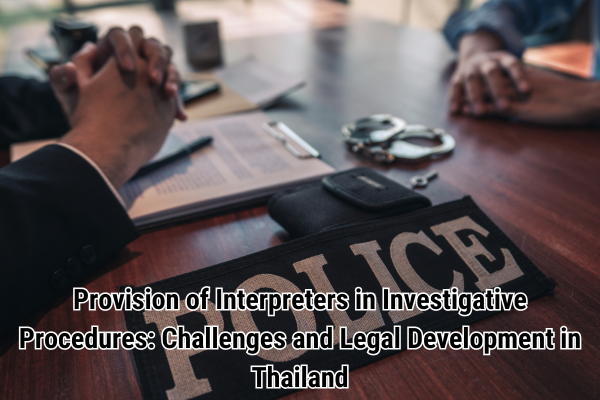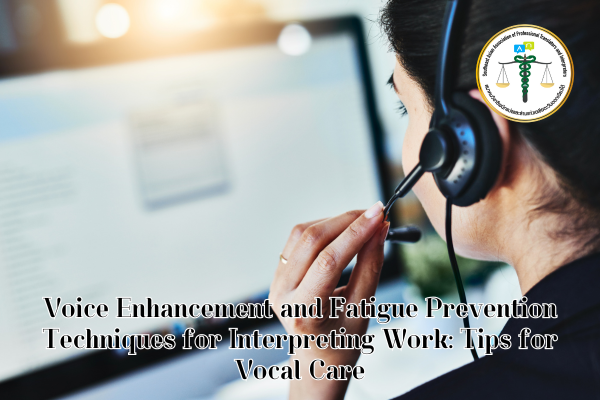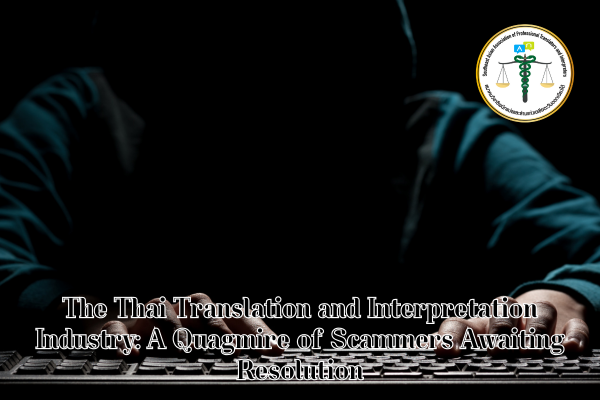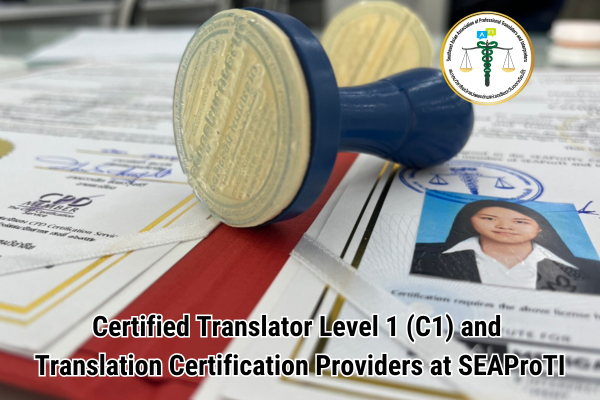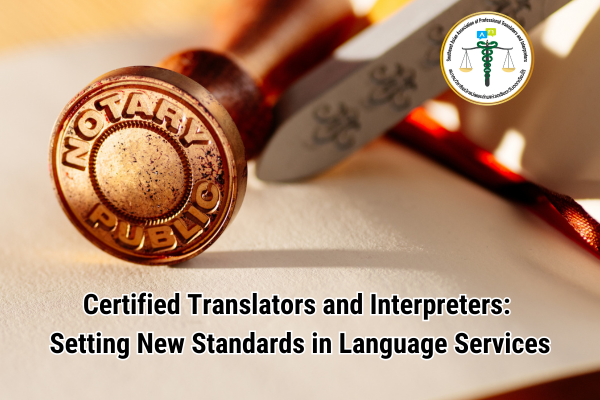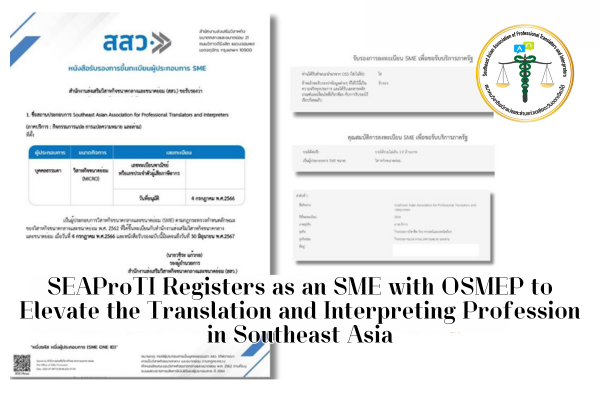Provision of Interpreters in Investigative Procedures: Challenges and Legal Development in Thailand
29 January 2028, Bangkok – Equal access to justice is a fundamental human right. However, in a multicultural and multilingual society like Thailand, the use of the Thai language as the primary medium in criminal investigations can create significant barriers for those unable to communicate or understand it fluently. Interpreters play a vital role in bridging this communication gap, ensuring mutual understanding between involved parties and law enforcement officers. Nevertheless, legal issues regarding the qualifications and provision of interpreters in Thailand highlight the need for comprehensive legislative reforms to meet current and future demands.
Legal Challenges in Interpreter Provision in Thailand
Although Thailand’s Criminal Procedure Code, Section 13, includes provisions for interpreters, key shortcomings remain, such as:
-
Lack of Defined Qualifications
The law does not specify the qualifications or certifications required for interpreters, leading to inconsistent standards in the selection process. This can impact the accuracy of translations and the overall integrity of investigations. -
Inadequate Provision Mechanisms
The law only mandates that investigators arrange interpreters “without delay” but fails to specify how or from where interpreters should be sourced. This creates delays and uncertainties in the process. -
Impact on Investigations
The use of unqualified or unethical interpreters, such as those with conflicts of interest, may undermine the credibility of witness statements or evidence, potentially rendering investigations invalid.
Comparative Study of International Practices
A comparison with countries that have established interpreter standards, such as the United States, the United Kingdom, and Australia, reveals practices that can be adapted for Thailand:
-
United States
- The Judicial Council defines interpreter qualifications, requiring at least a bachelor’s degree and certification.
- The Administrative Office of the Courts administers certification programs and oversees interpreter selection.
-
United Kingdom
- Interpreters must register with the National Registered Public Service Interpreters (NRPSI).
- Criminal record checks are mandatory, especially for interpreters working with vulnerable groups such as children or individuals with mental impairments.
-
Australia
- The National Accreditation Authority for Translators and Interpreters (NAATI) sets interpreter standards and certifies qualifications.
- Interpreters are bound by a strict code of ethics and conduct, ensuring professional accountability.
Recommendations for Legal Development in Thailand
To address existing gaps and improve interpreter-related legislation, the following measures are proposed:
-
Defining Interpreter Qualifications
- Interpreters must hold a bachelor’s degree in linguistics or demonstrate advanced proficiency in Thai and the source language.
- They should undergo training and pass professional interpreting examinations.
- Ethical standards and integrity must be emphasized as core qualifications.
-
Establishing a Dedicated Interpreter Agency
- A state agency should be established to oversee interpreter recruitment, training, and certification.
- The agency should maintain a registry of qualified interpreters across regions for efficient sourcing during investigations.
-
Enforcing Penalties for Misconduct
- Interpreters who compromise the investigation process through negligence or unethical behavior should face clear disciplinary actions, including license revocation.
-
Leveraging Technology for Interpreter Access
- Develop an online platform listing certified interpreters to enable investigators to find suitable interpreters efficiently.
Anticipated Outcomes
Reforming the legal framework for interpreter provision will minimize risks associated with unqualified interpreters, enhance trust in the justice system, and ensure fair access to justice for all individuals, regardless of their language abilities.
Conclusion: Toward a Just and Equitable System
The challenges surrounding interpreter provision in Thailand underscore the urgency of reforming legislation to address gaps in qualifications and sourcing mechanisms. By adopting best practices from other countries and tailoring them to Thailand’s context, the justice system can achieve international standards and foster confidence in investigative processes.
“Interpreters are not just language facilitators but bridges to mutual understanding and justice in the legal process.”
SEAProTI’s certified translators, translation certification providers, and certified interpreters:
The Southeast Asian Association of Professional Translators and Interpreters (SEAProTI) has officially announced the criteria and qualifications for individuals to register as “Certified Translators,” “Translation Certification Providers,” and “Certified Interpreters” under the association’s regulations. These guidelines are detailed in Sections 9 and 10 of the Royal Thai Government Gazette, issued by the Secretariat of the Cabinet under the Office of the Prime Minister of the Kingdom of Thailand, dated July 25, 2024, Volume 141, Part 66 Ng, Page 100.
To read the full publication, visit: the Royal Thai Government Gazette
การจัดหาล่ามในชั้นสอบสวน: ปัญหาและแนวทางการพัฒนากฎหมายในประเทศไทย
26 กรกฎาคม 2568, กรุงเทพมหานคร – การเข้าถึงกระบวนการยุติธรรมอย่างเท่าเทียมเป็นสิทธิขั้นพื้นฐานของทุกคน แต่ในสังคมที่มีความหลากหลายทางภาษาและวัฒนธรรม การใช้ภาษากลางอย่างภาษาไทยในกระบวนการสอบสวนอาจเป็นอุปสรรคต่อผู้ที่ไม่สามารถสื่อสารหรือเข้าใจภาษาไทยได้อย่างถ่องแท้ ล่ามจึงมีบทบาทสำคัญในการแปลภาษา สร้างความเข้าใจระหว่างคู่กรณีและเจ้าหน้าที่รัฐ แต่ปัญหาด้านกฎหมายเกี่ยวกับคุณสมบัติและการจัดหาล่ามในประเทศไทยยังคงเป็นประเด็นที่ต้องได้รับการพัฒนาเพื่อรองรับความต้องการในปัจจุบันและอนาคต
ปัญหาด้านกฎหมายเกี่ยวกับการจัดหาล่ามในประเทศไทย
แม้ประเทศไทยจะมีการบัญญัติเรื่องล่ามไว้ใน ประมวลกฎหมายวิธีพิจารณาความอาญา มาตรา 13 แต่ยังพบว่ามีข้อจำกัดสำคัญ ได้แก่:
-
การขาดเกณฑ์คุณสมบัติที่ชัดเจน
กฎหมายไม่ได้ระบุว่าล่ามที่เหมาะสมต้องมีคุณสมบัติหรือการรับรองด้านใด ทำให้การคัดเลือกล่ามในบางกรณีขาดมาตรฐาน ส่งผลต่อความถูกต้องของการแปลและกระบวนการสอบสวน -
การจัดหาล่ามที่ไม่ครอบคลุม
กฎหมายกำหนดให้พนักงานสอบสวนต้องจัดหาล่ามโดยมิชักช้า แต่ไม่ได้ระบุวิธีการหรือหน่วยงานที่รับผิดชอบโดยตรง ส่งผลให้เกิดความล่าช้าและความไม่แน่นอนในกระบวนการจัดหาล่าม -
ผลกระทบต่อกระบวนการสอบสวน
หากล่ามที่จัดหาไม่มีความสามารถหรือขาดจริยธรรม เช่น เป็นผู้มีส่วนได้เสียในคดี อาจส่งผลต่อความน่าเชื่อถือของคำให้การหรือพยานหลักฐาน ทำให้การสอบสวนเป็นโมฆะ
การศึกษาเปรียบเทียบกฎหมายเกี่ยวกับล่ามในต่างประเทศ
การศึกษาเปรียบเทียบกับกฎหมายในประเทศที่มีมาตรฐานด้านล่ามชัดเจน เช่น สหรัฐอเมริกา อังกฤษ และออสเตรเลีย พบว่ามีแนวปฏิบัติที่สามารถนำมาประยุกต์ใช้ในประเทศไทย ได้แก่:
-
สหรัฐอเมริกา
- สภาตุลาการ (Judicial Council) กำหนดคุณสมบัติล่าม เช่น ต้องมีการศึกษาระดับปริญญาตรี และได้รับใบรับรองความสามารถ
- สำนักงานบริหารศาลมีหน้าที่จัดโปรแกรมรับรองล่ามและคัดเลือกบุคคลที่เหมาะสม
-
อังกฤษ
- ล่ามต้องขึ้นทะเบียนกับหน่วยงาน National Registered Public Service Interpreters (NRPSI)
- ล่ามต้องผ่านการตรวจสอบประวัติอาชญากรรมอย่างละเอียด โดยเฉพาะหากทำงานกับกลุ่มเปราะบาง เช่น เด็กหรือผู้ที่มีสติปัญญาด้อยกว่า
-
ออสเตรเลีย
- มีหน่วยงาน National Accreditation Authority for Translators and Interpreters (NAATI) ที่กำหนดมาตรฐานคุณสมบัติและรับรองวิทยฐานะล่าม
- ล่ามต้องปฏิบัติตามประมวลจริยธรรมและจรรยาบรรณที่เข้มงวด
แนวทางการพัฒนากฎหมายในประเทศไทย
เพื่อแก้ไขข้อบกพร่องและพัฒนากฎหมายเกี่ยวกับล่ามในชั้นสอบสวน ควรดำเนินการในแนวทางดังต่อไปนี้:
-
การกำหนดคุณสมบัติล่าม
- ล่ามต้องสำเร็จการศึกษาระดับปริญญาตรีด้านภาษาศาสตร์ หรือมีความรู้ภาษาไทยและภาษาต้นทางในระดับดีเยี่ยม
- ผ่านการฝึกอบรมและการทดสอบความรู้ด้านการล่าม
- มีจริยธรรมและความซื่อสัตย์สุจริต
-
การจัดตั้งหน่วยงานเฉพาะด้านล่าม
- ควรจัดตั้งหน่วยงานรัฐที่มีอำนาจหน้าที่ในการคัดเลือก อบรม และรับรองล่าม รวมถึงดูแลด้านการปฏิบัติหน้าที่
- หน่วยงานนี้ควรจัดทำทะเบียนล่ามที่มีคุณสมบัติเหมาะสมในแต่ละภูมิภาค เพื่อให้การจัดหาล่ามเป็นไปอย่างรวดเร็วและมีประสิทธิภาพ
-
การกำหนดบทลงโทษล่ามที่ไม่ปฏิบัติตามมาตรฐาน
- หากล่ามกระทำการที่ก่อให้เกิดความเสียหายในกระบวนการสอบสวน ควรมีบทลงโทษที่ชัดเจน เช่น การเพิกถอนใบรับรอง
-
การใช้เทคโนโลยีสนับสนุนการจัดหาล่าม
- พัฒนาแพลตฟอร์มออนไลน์ที่รวบรวมข้อมูลล่ามที่ผ่านการรับรอง ช่วยให้พนักงานสอบสวนสามารถค้นหาล่ามได้สะดวก
ผลที่คาดว่าจะได้รับ
การปรับปรุงกฎหมายเกี่ยวกับล่ามในชั้นสอบสวนจะช่วยลดความเสี่ยงที่อาจเกิดขึ้นจากการใช้ล่ามที่ไม่มีคุณภาพ เพิ่มความเชื่อมั่นในกระบวนการยุติธรรม และส่งเสริมสิทธิในการเข้าถึงกระบวนการยุติธรรมของทุกคนอย่างเท่าเทียม
บทสรุป: เพื่อกระบวนการยุติธรรมที่เป็นธรรม
ปัญหาด้านการจัดหาล่ามในประเทศไทยสะท้อนถึงความจำเป็นในการปรับปรุงกฎหมายให้ครอบคลุมและเหมาะสมยิ่งขึ้น การกำหนดคุณสมบัติล่าม การจัดตั้งหน่วยงานดูแล และการนำแนวปฏิบัติที่ดีจากต่างประเทศมาใช้จะช่วยพัฒนาระบบยุติธรรมของไทยให้มีมาตรฐานระดับสากล และสร้างความมั่นใจในกระบวนการสอบสวนในทุกกรณี
เกี่ยวกับนักแปลรับรอง ผู้รับรองการแปล และล่ามรับรองของสมาคมวิชาชีพนักแปลและล่ามแห่งเอเชียตะวันออกเฉียงใต้
สมาคมวิชาชีพนักแปลและล่ามแห่งเอเชียตะวันออกเฉียงใต้ (SEAProTI) ได้ประกาศหลักเกณฑ์และคุณสมบัติผู้ที่ขึ้นทะเบียนเป็น “นักแปลรับรอง (Certified Translators) และผู้รับรองการแปล (Translation Certification Providers) และล่ามรับรอง (Certified Interpreters)” ของสมาคม หมวดที่ 9 และหมวดที่ 10 ในราชกิจจานุเบกษา ของสำนักเลขาธิการคณะรัฐมนตรี ในสำนักนายกรัฐมนตรี แห่งราชอาณาจักรไทย ลงวันที่ 25 ก.ค. 2567 เล่มที่ 141 ตอนที่ 66 ง หน้า 100 อ่านฉบับเต็มได้ที่: นักแปลรับรอง ผู้รับรองการแปล และล่ามรับรอง


